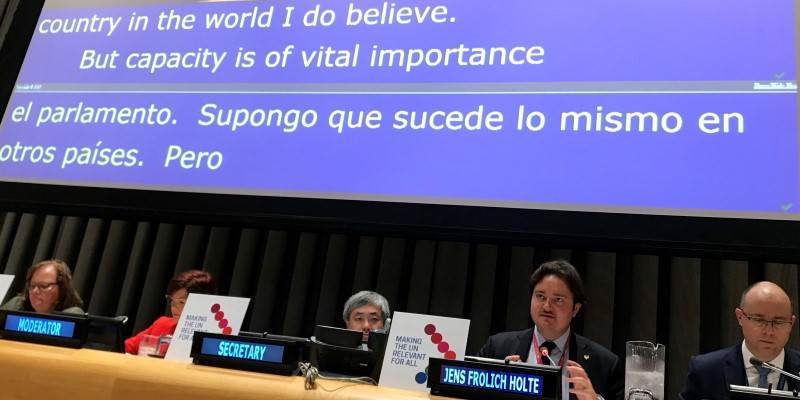Check against delivery
Illicit financial flows take many different forms. However, the result is always the same.
Ordinary people’s lives are being disrupted and their hopes stifled.
We must do what we can to finance development for all our countries. However, there is little point in trying to fill a bathtub if the water just runs down the drain.
It is not just the money being lost; citizens lose confidence in their elected leaders and public institutions. Citizens who pay taxes and contribute to society become angry and distrustful. Law-abiding companies find they are not competing on a level playing field, and the barriers to market entry are artificially high.
As long as a shadow financial system continues to exist, the whole fabric of society will be affected.
As long as corruption and deception are rewarded with wealth and prosperity, we are bound to fail in our goal of leaving no one behind.
As long as secrecy and misuse of power persist, markets will fail, and democracies will falter.
We simply must plug that drain.
***
As all of us here today are rightfully impatient for progress, we must also remember that progress has been made.
The G7, the G20, the OECD, the World Bank, the International Monetary Fund, the European Union, the African Union, and – not least – the United Nations General Assembly all agree. We must step up international cooperation to prevent corruption, stop financial crime and curtail illicit financial flows. In addition, several multinational companies and investment funds have expressed their support for this agenda.
This was not a given 15 years ago.
However, as we see the estimates of illicit financial flows increasing year-on-year - it is now time for this commitment to be translated into swift action.
So how might this action look like? Well, there is no need for magic. The method of how to stop illicit flows has already been well identified.
First, we must focus on national efforts. Effective international solutions are important, but they take time. National solutions are often within reach, but may not seem feasible for various reasons:
Such as the fear of being the first mover. The fear of being the first to make transparent beneficial ownership information a requirement or to institute more thorough tax audits, and set legal precedence. The fear that being the first mover on these issues will make crucial investments and job creation less attractive. The fear of losing a competitive edge or comparative advantage.
In the short-term, these fears are rational. However, in a long-term perspective, this is not the case. Tackling illicit financial flows may disturb a perverse balance in the short run, but will create strong markets and robust democracies in the longer run.
***
Another reason why tackling illicit flows at the national level may seem difficult is the prospect of certain failure. Although a leader may know what needs to be done, she may also ascertain that she does not have the capacity available to take the necessary steps.
This is a perfectly legitimate concern. Embarking on reform of tax policy and tax systems requires a civil service that has integrity, can exercise leadership and –crucially – has capacity. This means having access to sufficient expertise.
In some instances this necessitates international support. Committed experts in fields like complex tax auditing, compliance verification, transfer pricing, tax legislation, investigation of financial crime, are all crucial to reform. Finding experts in all these fields is challenging for any country.
Norway will fulfil its commitments to double its support to capacity-building in this field by 2020, and we look forward to seeing all the other signatories of the Addis Tax Initiative do the same. In that way, we improve the odds for success.
***
In my view, our international solutions must focus on three things: accelerated cooperation, far-reaching transparency, and unflinching justice.
First, the problems we face are global in nature. Criminals and malign opportunists are abusing loopholes and discrepancies in the global system to enrich themselves. Accelerating international cooperation may seem risky and costly, but we must invest in it if we are to make progress.
We need the global organizations to lead the way and help us develop the norms and rules that are necessary to close the loopholes - for good. We need to put in place standards and practices in international accounting and finance that are fit for purpose in today’s global economy. We need accelerated cooperation.
Second, far-reaching transparency policies must be pursued. We must aim for a future where all countries automatically share critical tax information with each other. We must develop a harmonized system of beneficial ownership registries so that any country can assess who is really benefiting from economic activity and value creation in their economy. Transparency is good for business, and good for governance.
Achieving far-reaching transparency requires intense international effort to improve the way intellectual property information and sensitive business information are handled. However, we must be willing to err on the side of transparency, rather than on the side of secrecy.
Third, international crime must be met with unflinching justice. Legislation must be internationally coordinated and updated to keep up with new methods that are continually being developed by those engaged in these activities. Closer international cooperation on investigating and prosecuting illicit financial flows must also be developed.
Financial intelligence units must find ways of cooperating seamlessly across borders, and litigation must be prioritised and not be allowed to drag on for years.
I am an optimist. I believe that renewed attention to these issues will foster stronger leadership. Norway will do what we can to accelerate that process.
Thank you.
